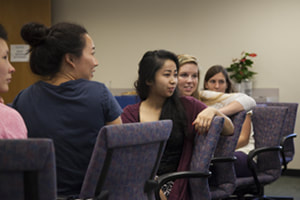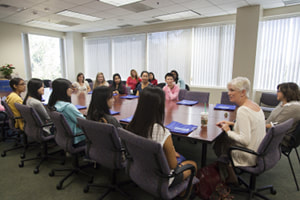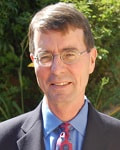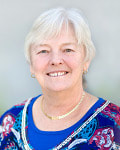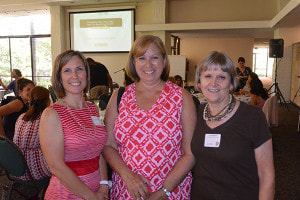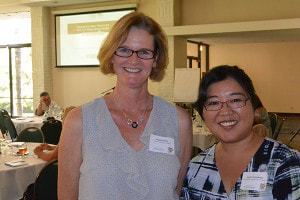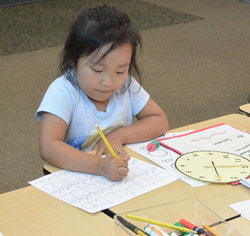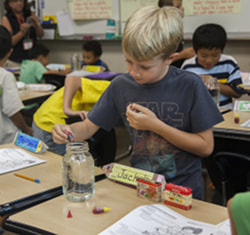Newsletter - Fall 2014
Assistant Professors Drew Bailey and Maria Rosales-Rueda Join UCI School of Education
Drew Bailey received his Ph.D. in Developmental Psychology, with a minor in Psychological Statistics and Methods, in 2012 from the University of Missouri. Prior to joining the faculty at UC Irvine, he was an IES postdoctoral research fellow at Carnegie Mellon University.
Dr. Bailey’s research focuses on questions pertaining to individual differences in children’s mathematical development, such as:
* Why do some children find math so difficult?
* Why do children who struggle with math early in school often continue to struggle with math throughout their lives?
* What kinds of practices can be used to enhance math learning for all children?
To address these questions, Dr. Bailey’s research compares children from different age groups, different ability levels, different levels of previous knowledge, and different cultures.
-----------------------------------------------------
Maria Rosales-Rueda received her Ph.D. in Public Policy with a specialization in human capital and program evaluation, in June 2014, from the University of Chicago. Her dissertation explored the interactions between family investments, early-life shocks, and human capital formation among children in both developing and developed countries.
Dr. Rosales-Rueda is interested in understanding the formation of human capital across the life cycle with a special focus on the importance of early childhood. Key to her research is the notion that human capital encompasses skills that are multiple in nature and related to cognition, personality, and health. Her research agenda explores questions such as:
Hallmarks of her research include the combination of large, nationally representative longitudinal, and experimental data with strong quantitative methods designed to approximate causal analyses.
Drew Bailey received his Ph.D. in Developmental Psychology, with a minor in Psychological Statistics and Methods, in 2012 from the University of Missouri. Prior to joining the faculty at UC Irvine, he was an IES postdoctoral research fellow at Carnegie Mellon University.
Dr. Bailey’s research focuses on questions pertaining to individual differences in children’s mathematical development, such as:
* Why do some children find math so difficult?
* Why do children who struggle with math early in school often continue to struggle with math throughout their lives?
* What kinds of practices can be used to enhance math learning for all children?
To address these questions, Dr. Bailey’s research compares children from different age groups, different ability levels, different levels of previous knowledge, and different cultures.
-----------------------------------------------------
Maria Rosales-Rueda received her Ph.D. in Public Policy with a specialization in human capital and program evaluation, in June 2014, from the University of Chicago. Her dissertation explored the interactions between family investments, early-life shocks, and human capital formation among children in both developing and developed countries.
Dr. Rosales-Rueda is interested in understanding the formation of human capital across the life cycle with a special focus on the importance of early childhood. Key to her research is the notion that human capital encompasses skills that are multiple in nature and related to cognition, personality, and health. Her research agenda explores questions such as:
- Why do human capital gaps between socio-economically diverse children emerge early in life?
- How do these gaps contribute to later educational, health, and wage inequalities?
- Can public policy interventions remediate or mitigate early disadvantage?
Hallmarks of her research include the combination of large, nationally representative longitudinal, and experimental data with strong quantitative methods designed to approximate causal analyses.
|
Enrollment in New Bachelor of Arts in Education Sciences Exceeds 300
Twenty incoming freshmen and more than 280 continuing students have chosen the new Bachelor of Arts in Education Sciences as their first or second major. This new major, the first in the University of California system, builds a theoretical foundation and applied understandings to the study of education. The major focuses on four primary areas:
Undergraduates have the option of selecting from six specializations:
|
Fifteen New Ph.D. in Education Students Admitted for Fall 2014
Fifteen new students, five men and ten women, are joining the Ph.D. in Education program. Six have selected the Learning, Cognition, and Development (LCD) specialization; three will be pursuing the Educational Policy and Social Context (EPSC) specialization; and six chose Language, Literacy, and Technology (LLT).
The 15 students were admitted from a highly competitive pool of 153 national and international applicants.
The Fall 2014 students represent six countries of origin: Canada, Israel, Korea, People’s Republic of China (including Hong Kong), Viet Nam, and the United States.
They bring to the doctoral program knowledge of nine diverse languages: Arabic, French, German, Hebrew, Korean, Mandarin, Portuguese, Vietnamese, and English.
The incoming students earned bachelor’s degrees from nine different universities: Beijing Normal University, UC Berkeley, CSU Los Angeles, Korea Military Academy, Pepperdine, UC Irvine, UCLA, UC San Diego, and University of Texas at Austin. Their undergraduate majors included Anthropology, Biology, Economics, Educational Technology, Electrical Engineering, English, Liberal Arts, Linguistics, Psychology, Public Health, and Sociology.
Ten of the students also earned advanced degrees, from Beijing Normal University, CSU Dominguez Hills, CSU Los Angeles, Harvard University, Institute of Arabic and Islamic Research, National University, Pepperdine, Seoul National University, and UC Irvine. Degrees were awarded in Administration, Education/Distance Education, English Language and Literature, Psychology, Public Policy, and Teaching Credential.
The students’ professional experience includes faculty positions (adjunct faculty, assistant professor, and lecturer), charter school director, engineer, K-12 teaching, military officer, music teacher, preschool teacher, translator, and UCI Writing Project Fellow.
Fifteen new students, five men and ten women, are joining the Ph.D. in Education program. Six have selected the Learning, Cognition, and Development (LCD) specialization; three will be pursuing the Educational Policy and Social Context (EPSC) specialization; and six chose Language, Literacy, and Technology (LLT).
The 15 students were admitted from a highly competitive pool of 153 national and international applicants.
The Fall 2014 students represent six countries of origin: Canada, Israel, Korea, People’s Republic of China (including Hong Kong), Viet Nam, and the United States.
They bring to the doctoral program knowledge of nine diverse languages: Arabic, French, German, Hebrew, Korean, Mandarin, Portuguese, Vietnamese, and English.
The incoming students earned bachelor’s degrees from nine different universities: Beijing Normal University, UC Berkeley, CSU Los Angeles, Korea Military Academy, Pepperdine, UC Irvine, UCLA, UC San Diego, and University of Texas at Austin. Their undergraduate majors included Anthropology, Biology, Economics, Educational Technology, Electrical Engineering, English, Liberal Arts, Linguistics, Psychology, Public Health, and Sociology.
Ten of the students also earned advanced degrees, from Beijing Normal University, CSU Dominguez Hills, CSU Los Angeles, Harvard University, Institute of Arabic and Islamic Research, National University, Pepperdine, Seoul National University, and UC Irvine. Degrees were awarded in Administration, Education/Distance Education, English Language and Literature, Psychology, Public Policy, and Teaching Credential.
The students’ professional experience includes faculty positions (adjunct faculty, assistant professor, and lecturer), charter school director, engineer, K-12 teaching, military officer, music teacher, preschool teacher, translator, and UCI Writing Project Fellow.
Announces Completion of 5-Year IES Goal 3 Evaluation of ST Math Program
Professor George Farkas announced the completion of the 5-year Goal 3 Evaluation, funded by Institute of Education Sciences (IES) and initiated by Professor Michael E. Martinez.
The evaluation studied the Spatial Temporal Math program (ST Math), a supplementary math learning software created by the MIND Research Institute.
Over the five year study, researchers collected data on ~500,000 second through fifth grade students in a randomized control trial conducted in 52 schools. Six professors and 13 students worked on the project during its duration.
In two separate publications, researchers described the modest positive effect of ST Math on general mathematics skills, noting improvements in the Number Sense sub-skill.
Schenke, K., Rutherford, T., & Farkas, G. (2014 April). Alignment of game design features and state mathematics standards: Do results reflect intentions? Computers and Education, 76, 215-224.
Rutherford, T, Farkas, G., Duncan, G., Burchinal, M., Kibrick, M., Graham, J., Richland, L., Tran, N., Schneider, S, Duran, L., & Martinez, M.E. (2014 March). A randomized trial of an elementary school mathematics software intervention: Spatial-Temporal (ST) Math. Journal of Research on Educational Effectiveness. DOI: 10.1080/19345747.2013.856978.
Professor George Farkas announced the completion of the 5-year Goal 3 Evaluation, funded by Institute of Education Sciences (IES) and initiated by Professor Michael E. Martinez.
The evaluation studied the Spatial Temporal Math program (ST Math), a supplementary math learning software created by the MIND Research Institute.
Over the five year study, researchers collected data on ~500,000 second through fifth grade students in a randomized control trial conducted in 52 schools. Six professors and 13 students worked on the project during its duration.
In two separate publications, researchers described the modest positive effect of ST Math on general mathematics skills, noting improvements in the Number Sense sub-skill.
Schenke, K., Rutherford, T., & Farkas, G. (2014 April). Alignment of game design features and state mathematics standards: Do results reflect intentions? Computers and Education, 76, 215-224.
Rutherford, T, Farkas, G., Duncan, G., Burchinal, M., Kibrick, M., Graham, J., Richland, L., Tran, N., Schneider, S, Duran, L., & Martinez, M.E. (2014 March). A randomized trial of an elementary school mathematics software intervention: Spatial-Temporal (ST) Math. Journal of Research on Educational Effectiveness. DOI: 10.1080/19345747.2013.856978.
AERA Open, Edited by 3 UCI Professors, Accepting Submissions
|
From AERA Open's Inaugural Editorial
Through AERA Open, the editors seek to promote strong educational research; strengthen the ties between researchers, policymakers, and practitioners; and foster greater international communication and collaboration in educational scholarship. Four goals are guiding publication of the journal. (1) Open to Readers and Authors. AERA Open will be freely available to everyone, and articles will be published as soon as they have been accepted, copy-edited, and type-set online. By providing rapid access to high-quality scholarship, the editors seek to establish better connections among diverse audiences in the United States and abroad in the fields of educational research, policy, and practice. (2) Open to Disciplines and Contexts. A goal is to make this AERA Open an exciting home for rigorous research on education conducted in a wide range of academic disciplines, including emerging areas such as educational neuroscience, behavioral economics, and learning analytics. (3) Open to Inspection and Replication. Contributors are being asked to engage in extensive robustness-checking using alternative estimation techniques or data sets and report results in online appendices; publish their research instruments, protocols, guides, and, to the extent possible, data; and, if appropriate, include direct replications of related findings from published research. (4) Open and Accessible to a Broad Audience. The editors encourage authors of empirical articles to consider submitting carefully honed manuscripts that are shorter in length and in the following format:
Such a format is intended to allow the broadest possible audience to read the empirical studies, while also enabling those with deeper interests to explore further details in appendices, and to replicate and extend key results. In keeping with this fourth goal, the editors encourage submission of comprehensive reports of large-scale projects that are integrative rather than more piecemeal reports of isolated sets of findings. For such reports, the essence of the analytic goals and findings should be summarized in the main article with the more comprehensive details included in the unconstrained appendices. |
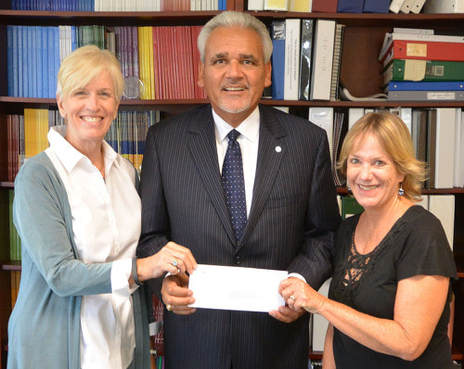 Mr. Richard Porras, AT&T Regional Vice President, with Dean Vandell (l) and Associate Professor Olson (r).
Mr. Richard Porras, AT&T Regional Vice President, with Dean Vandell (l) and Associate Professor Olson (r).
UCI School of Education receives $300,000 gift from AT&T to support Pathway Intervention Project
The School of Education received a $300,000 gift from AT&T to support its recent $11 million dollar grant from the U.S. Department of Education Office of Innovation and Improvement for The Pathway Intervention Project. This is the school’s first corporate gift.
The Pathway Intervention Project is aimed at helping English Learners (EL) successfully complete courses in core academic subjects and meet the rigorous California Common Core State Standards for English Language Arts.
The project is led by Carol Booth Olson, director of the UC Irvine Writing Project and associate professor of education, with support from UCI Ph.D. students. The project will involve 240 Grades 7-12 teachers and their students in four school districts across the Southern California region. The project aims to close the achievement gap for EL students by providing high-quality professional development to teachers in the Pathway intervention, thereby improving teaching quality to help secondary ELs successfully complete courses in core academic subjects and become college-bound. Student outcomes will include improvements in writing as measured by an on-demand pre/post assessment of analytical essay writing and State and district assessments, ELA standardized test scores, and high school graduation rates. The project will serve 105,000 students in the districts throughout southern California.
The School of Education received a $300,000 gift from AT&T to support its recent $11 million dollar grant from the U.S. Department of Education Office of Innovation and Improvement for The Pathway Intervention Project. This is the school’s first corporate gift.
The Pathway Intervention Project is aimed at helping English Learners (EL) successfully complete courses in core academic subjects and meet the rigorous California Common Core State Standards for English Language Arts.
The project is led by Carol Booth Olson, director of the UC Irvine Writing Project and associate professor of education, with support from UCI Ph.D. students. The project will involve 240 Grades 7-12 teachers and their students in four school districts across the Southern California region. The project aims to close the achievement gap for EL students by providing high-quality professional development to teachers in the Pathway intervention, thereby improving teaching quality to help secondary ELs successfully complete courses in core academic subjects and become college-bound. Student outcomes will include improvements in writing as measured by an on-demand pre/post assessment of analytical essay writing and State and district assessments, ELA standardized test scores, and high school graduation rates. The project will serve 105,000 students in the districts throughout southern California.
Mentor Teachers Prepare for Co-Teaching with UCI Teacher Candidates
The School of Education teacher education programs partner with teachers in area schools to provide mentorship from experienced professionals for teacher candidates during their student teaching experience.
Each year over 200 Orange County teachers open their classrooms and share their expertise with candidates placed in their schools.
On September 15, the School of Education hosted an orientation for mentor teachers: "Preparing New Teachers: The Co-Teaching Model."
Director of Teacher Education Virginia Panish, Multiple Subject Coordinator Susan Toma-Berge, Single Subject Coordinator Sue Vaughn, Cal Teach Science Master Teacher Terry Shanahan, and Cal Teach Math Master Teacher Kris Houston coordinated the orientation.
Encouraging discussion and providing examples that could be employed during the fall co-teaching experience, UCI School of Education faculty reviewed the key components of high-quality co-teaching models: (a) conferring, purposeful observing, debriefing; and (b) conferring, observed practicing, reflecting.
Proposing an alternating "one teach, one support" model, faculty recommended that fall activities include the following:
The School of Education teacher education programs partner with teachers in area schools to provide mentorship from experienced professionals for teacher candidates during their student teaching experience.
Each year over 200 Orange County teachers open their classrooms and share their expertise with candidates placed in their schools.
On September 15, the School of Education hosted an orientation for mentor teachers: "Preparing New Teachers: The Co-Teaching Model."
Director of Teacher Education Virginia Panish, Multiple Subject Coordinator Susan Toma-Berge, Single Subject Coordinator Sue Vaughn, Cal Teach Science Master Teacher Terry Shanahan, and Cal Teach Math Master Teacher Kris Houston coordinated the orientation.
Encouraging discussion and providing examples that could be employed during the fall co-teaching experience, UCI School of Education faculty reviewed the key components of high-quality co-teaching models: (a) conferring, purposeful observing, debriefing; and (b) conferring, observed practicing, reflecting.
Proposing an alternating "one teach, one support" model, faculty recommended that fall activities include the following:
- Both teachers are involved in planning.
- Both teachers co-teach using one of the many co-teaching models.
- Both teachers are involved in assessing student learning.
UCI Writing Project Serves More Than 2,000 PreK-12th Grade Youth
The UCI Writing Project Summer Youth Program concluded its 30th summer of offering programs for Prek-12th grade children and youth.
Serving over 2,000 young people, credentialed teachers engaged participants in creative writing activities in the morning, and math challenges and science experiments in the afternoon at five different locations throughout Orange County.
During the creative writing portion, teachers employed strategies emphasizing a step-by-step approach to writing to help students enhance reading and writing abilities identified in the California Common Core State Standards.
Each three-week session featured a presentation session for parents and friends showcasing student work.
The UCI Writing Project Summer Youth Program concluded its 30th summer of offering programs for Prek-12th grade children and youth.
Serving over 2,000 young people, credentialed teachers engaged participants in creative writing activities in the morning, and math challenges and science experiments in the afternoon at five different locations throughout Orange County.
During the creative writing portion, teachers employed strategies emphasizing a step-by-step approach to writing to help students enhance reading and writing abilities identified in the California Common Core State Standards.
Each three-week session featured a presentation session for parents and friends showcasing student work.
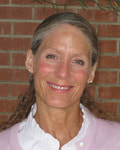
Alumna Donates Scholarship for Bilingual Candidates
Dr. Gail Spivack (M.A.T./2010) is committed to promoting bilingual education. She calls herself a "professional volunteer," and is in her sixth year as a volunteer English Language Arts and reading teacher at El Sol Academy in Santa Ana, which she describes as "my best job ever!”
Dr. Spivack's experience as an educator has spanned several states and included a variety of vocations. She started her post-secondary education at a Florida community college where she earned a license as a medical technologist. After seven years of working as a med tech running labs in primary care physician practices, she earned a B.S. in Textile Science from Florida State University, an M.S. in Textile Materials and Management from North Carolina State, and a Ph.D. in Textiles from Virginia Tech. Throughout her education, Gail worked in university health center labs as a med tech in the evenings and on weekends.
After earning her Ph.D, Gail was hired as an assistant professor at Cornell University in the Department of Textiles. Subsequently, Gail was employed as a research scientist at Procter & Gamble (P&G) in Cincinnati, Ohio. After retirement from P&G and a move to California, Gail began volunteering in the THINK Togetherafter-school program at Sepulveda Elementary in Santa Ana, and her belief in importance of bilingual education grew with her experience in Southern California classrooms. Accordingly, during her time at Sepulveda Gail decided to earn a certificate in Teaching English as a Second Language (TESL) from UC Irvine Extension.
After completing the TESL program, Gail realized that she wanted more; she wanted to be able to input into the curriculum and methods of instruction in the classroom, not just deliver someone else’s program.
Gail considers herself very lucky to have found her niche, and the opportunity to teach at El Sol.
Dr. Spivack's scholarship will be awarded fall quarter to select students pursuing their bilingual certification.
Dr. Gail Spivack (M.A.T./2010) is committed to promoting bilingual education. She calls herself a "professional volunteer," and is in her sixth year as a volunteer English Language Arts and reading teacher at El Sol Academy in Santa Ana, which she describes as "my best job ever!”
Dr. Spivack's experience as an educator has spanned several states and included a variety of vocations. She started her post-secondary education at a Florida community college where she earned a license as a medical technologist. After seven years of working as a med tech running labs in primary care physician practices, she earned a B.S. in Textile Science from Florida State University, an M.S. in Textile Materials and Management from North Carolina State, and a Ph.D. in Textiles from Virginia Tech. Throughout her education, Gail worked in university health center labs as a med tech in the evenings and on weekends.
After earning her Ph.D, Gail was hired as an assistant professor at Cornell University in the Department of Textiles. Subsequently, Gail was employed as a research scientist at Procter & Gamble (P&G) in Cincinnati, Ohio. After retirement from P&G and a move to California, Gail began volunteering in the THINK Togetherafter-school program at Sepulveda Elementary in Santa Ana, and her belief in importance of bilingual education grew with her experience in Southern California classrooms. Accordingly, during her time at Sepulveda Gail decided to earn a certificate in Teaching English as a Second Language (TESL) from UC Irvine Extension.
- I tutored first graders in English Language Arts and Math for three years at Sepulveda and fell in love with the kids and the challenges. I entered the TESL program to learn how to help my first graders succeed as they bridged two cultures and two languages. I also took Spanish at UC Irvine for the same reason.
After completing the TESL program, Gail realized that she wanted more; she wanted to be able to input into the curriculum and methods of instruction in the classroom, not just deliver someone else’s program.
- I was interested in a graduate teaching program that emphasized multicultural commitment and awareness, along with rigorous grounding in pedagogy and subject matter expertise. The Master of Arts in Teaching (M.A.T.) program at UCI fit the bill on paper, and more than delivered in practice.
Gail considers herself very lucky to have found her niche, and the opportunity to teach at El Sol.
- El Sol is a dual language immersion charter in SAUSD. By third grade some students are struggling with the increasing percent of curriculum delivered in English, and I serve as a resource to those students and their teachers. I teach small group reading and ELA classes and use everything I learned in the MAT program every day. Spending time with smart and funny third graders, and their dedicated teachers and committed parents, makes this the best job I’ve ever had.
Dr. Spivack's scholarship will be awarded fall quarter to select students pursuing their bilingual certification.
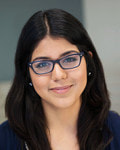 Alumna Brenda Minjares
KSTF Teaching Fellow
Alumna Brenda Minjares
KSTF Teaching Fellow
Alumna Awarded 2014 Knowles Science Teaching Foundation (KSTF) Fellowship
Alumna Brenda Minjares has been awarded a 2014 Knowles Science Teaching Foundation (KSTF) Teaching Fellow.
Selected from a pool of more than 180 applicants, Brenda is one of “32 exceptionally talented, early career science, technology, engineering and/or mathematics (STEM) teachers selected 2014 KSTF Teaching Fellows.”
Brenda is committed to teaching science to high school students in the United States. Reared in Santa Ana, California, by Albis and Oscar Minjares, Brenda graduated from Middle College High School in 2008. She holds a Master of Arts in Teaching (MAT) from UC Irvine. Additionally, she holds a
Bachelor of Science in physics education from the University of California, Santa Cruz (KSTF Press Release).
This September Brenda began her first year of teaching at Escondido High School, located in Escondido, California.
Alumna Brenda Minjares has been awarded a 2014 Knowles Science Teaching Foundation (KSTF) Teaching Fellow.
Selected from a pool of more than 180 applicants, Brenda is one of “32 exceptionally talented, early career science, technology, engineering and/or mathematics (STEM) teachers selected 2014 KSTF Teaching Fellows.”
Brenda is committed to teaching science to high school students in the United States. Reared in Santa Ana, California, by Albis and Oscar Minjares, Brenda graduated from Middle College High School in 2008. She holds a Master of Arts in Teaching (MAT) from UC Irvine. Additionally, she holds a
Bachelor of Science in physics education from the University of California, Santa Cruz (KSTF Press Release).
This September Brenda began her first year of teaching at Escondido High School, located in Escondido, California.
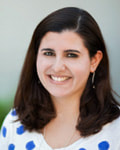
Awarded $50,000 Grant from U.S. Department of Health and Human Services
Ph.D. student Elizabeth Miller has been awarded a two-year, $50,000 "Early Care and Education Scholars: Child Care Graduate Student Research Grant" by the Administration for Children and Families, U.S. Department of Health and Human Services.
The grant will support Ms. Miller's dissertation research: "Use of Spanish in Head Start and Dual Language Learners’ Academic Achievement: A Mixed-Methods Study."
Ms. Miller studies socio-emotional development, parent-child interactions, and early childhood care and education. She is advised by Professor George Farkas.
Project Abstract
This mixed-methods study addresses several kindergarten-readiness topics:
To address these research questions, two nationally representative samples of Head Start children, families, and programs – the HSIS and the Head Start Family and Child Experiences Survey (FACES, 2009 Cohort) – will be analyzed.
Ph.D. student Elizabeth Miller has been awarded a two-year, $50,000 "Early Care and Education Scholars: Child Care Graduate Student Research Grant" by the Administration for Children and Families, U.S. Department of Health and Human Services.
The grant will support Ms. Miller's dissertation research: "Use of Spanish in Head Start and Dual Language Learners’ Academic Achievement: A Mixed-Methods Study."
Ms. Miller studies socio-emotional development, parent-child interactions, and early childhood care and education. She is advised by Professor George Farkas.
Project Abstract
This mixed-methods study addresses several kindergarten-readiness topics:
- What child, family, and institutional factors are associated with selection into Early Care and Education (ECE) environments that use Spanish?
- Are there main effects of Spanish use on academic school readiness skills?
- Does Head Start differentially benefit children spoken to in Spanish and/or instructed in Spanish?
To address these research questions, two nationally representative samples of Head Start children, families, and programs – the HSIS and the Head Start Family and Child Experiences Survey (FACES, 2009 Cohort) – will be analyzed.
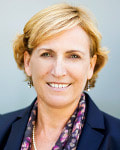
Named 2014 Newkirk Graduate Student Fellow
Ph.D. student Jennifer Long has been named a Newkirk Graduate Student Fellow for 2014-2015 and will receive an $8,000 fellowship in support of her doctoral research being conducted at Crystal Cove State Park in Laguna Beach. Ms. Long is investigating ecohydrology citizen science, posing the question: Can youth develop an understanding of systems by engaging in authentic research?
Ms. Long's project engages fourth and fifth grade students from El Morro Elementary School in an afterschool club that includes trips to Crystal Cove's Environmental Study Look to conduct on-site science research in echydrology. As she explains, "I am interested in helping children complete the scientific process from hypothesis to presentation, and I am studying whether this process helps them grasp difficult system concepts such as the water cycles."
The Newkirk Center for Science and Society, established at UC Irvine in 2001, is dedicated to improving science's response to community needs and to increasing the effective uses of scientific results for the benefit of society. The Center supports conferences, workshops, colloquia, lectures, and funding of research.
Ms. Long studies formal and informal science education, technology in education, and teacher preparation.
Project Abstract:
2014-2015 Newkirk Graduate Fellowship Award: Ecohydrology Citizen Science
Research Question: Can Youth Develop an Understanding of Systems by Engaging in Authentic Research?
Funding Agency: The Newkirk Center for Science and Society, UC Irvine
Researcher: Jennifer Long, Ph.D. in Education Student
Project Overview
This research is designed to study the influence of engaging in authentic research on youths’ science knowledge and skills. It involves students from a local elementary school, research scientists from UCI’s School of Biological Sciences, and Crystal Cove State Park staff in a Citizen Scientists’ After-school Club. During the intervention, youth participants engage in authentic, community-relevant research focusing on the study of ecohydrology. Changes in the water cycle represent both causes and consequences of contemporary climate change; no other large-scale Earth process is so critical to the human endeavor than the hydrologic cycle, which defines the availability of fresh water to support society. For the last decade, science has been attempting to understand how changes in ecosystem structure (i.e., plant transpiration) affects the partitioning of rainfall into the hydrologic components (Huxman et al., 2005)—how will a change in plant structure influence the loss of water back to the atmosphere and change patterns of river flow or aquifer recharge? Building on this research, the Citizen Scientists’ After-school Club will add to a large-scale database of where water goes as it cycles through the system, will provide data to park managers that can be used to inform management decisions, and will provide information to the general public about their State Park resources.
Project Goals
One goal of science education is to educate future citizens so that they are capable of navigating complex scientific concerns, understanding complex environmental issues, and acting in ways that maintain and protect Earth’s life-supporting ecological systems. Science knowledge, an understanding of science practice, and the ability to think in terms of systems can serve as important tools for making informed decisions about the natural world. As tomorrow’s decision-makers, today’s youth must build the integrated science knowledge and systems thinking capabilities that allow them to understand the complexity of natural systems and the role of science research in managing those systems. However, the complex nature of ecological systems and processes makes it challenging to teach ecology at all education levels, but it is particularly challenging elementary students to learn (Jacobson & Wilensky, 2006).
Research on citizen science projects may provide interesting and important insight into effective ways for youth to build science knowledge and skills by participating in authentic research. Citizen science refers to the engagement of non-scientists in scientific investigations, during which they generate useful and usable data for researchers. Citizen science offers powerful ways for learners to engage in community-based experiences, generate specific ecological knowledge, and develop science inquiry capabilities (Dickinson et al., 2012). Indeed, current research suggests that involvement in citizen science may lead to learner gains in content knowledge, more positive attitudes toward science, and deeper understandings of the scientific processes (Bonney et al., 2009).
Ph.D. student Jennifer Long has been named a Newkirk Graduate Student Fellow for 2014-2015 and will receive an $8,000 fellowship in support of her doctoral research being conducted at Crystal Cove State Park in Laguna Beach. Ms. Long is investigating ecohydrology citizen science, posing the question: Can youth develop an understanding of systems by engaging in authentic research?
Ms. Long's project engages fourth and fifth grade students from El Morro Elementary School in an afterschool club that includes trips to Crystal Cove's Environmental Study Look to conduct on-site science research in echydrology. As she explains, "I am interested in helping children complete the scientific process from hypothesis to presentation, and I am studying whether this process helps them grasp difficult system concepts such as the water cycles."
The Newkirk Center for Science and Society, established at UC Irvine in 2001, is dedicated to improving science's response to community needs and to increasing the effective uses of scientific results for the benefit of society. The Center supports conferences, workshops, colloquia, lectures, and funding of research.
Ms. Long studies formal and informal science education, technology in education, and teacher preparation.
Project Abstract:
2014-2015 Newkirk Graduate Fellowship Award: Ecohydrology Citizen Science
Research Question: Can Youth Develop an Understanding of Systems by Engaging in Authentic Research?
Funding Agency: The Newkirk Center for Science and Society, UC Irvine
Researcher: Jennifer Long, Ph.D. in Education Student
Project Overview
This research is designed to study the influence of engaging in authentic research on youths’ science knowledge and skills. It involves students from a local elementary school, research scientists from UCI’s School of Biological Sciences, and Crystal Cove State Park staff in a Citizen Scientists’ After-school Club. During the intervention, youth participants engage in authentic, community-relevant research focusing on the study of ecohydrology. Changes in the water cycle represent both causes and consequences of contemporary climate change; no other large-scale Earth process is so critical to the human endeavor than the hydrologic cycle, which defines the availability of fresh water to support society. For the last decade, science has been attempting to understand how changes in ecosystem structure (i.e., plant transpiration) affects the partitioning of rainfall into the hydrologic components (Huxman et al., 2005)—how will a change in plant structure influence the loss of water back to the atmosphere and change patterns of river flow or aquifer recharge? Building on this research, the Citizen Scientists’ After-school Club will add to a large-scale database of where water goes as it cycles through the system, will provide data to park managers that can be used to inform management decisions, and will provide information to the general public about their State Park resources.
Project Goals
One goal of science education is to educate future citizens so that they are capable of navigating complex scientific concerns, understanding complex environmental issues, and acting in ways that maintain and protect Earth’s life-supporting ecological systems. Science knowledge, an understanding of science practice, and the ability to think in terms of systems can serve as important tools for making informed decisions about the natural world. As tomorrow’s decision-makers, today’s youth must build the integrated science knowledge and systems thinking capabilities that allow them to understand the complexity of natural systems and the role of science research in managing those systems. However, the complex nature of ecological systems and processes makes it challenging to teach ecology at all education levels, but it is particularly challenging elementary students to learn (Jacobson & Wilensky, 2006).
Research on citizen science projects may provide interesting and important insight into effective ways for youth to build science knowledge and skills by participating in authentic research. Citizen science refers to the engagement of non-scientists in scientific investigations, during which they generate useful and usable data for researchers. Citizen science offers powerful ways for learners to engage in community-based experiences, generate specific ecological knowledge, and develop science inquiry capabilities (Dickinson et al., 2012). Indeed, current research suggests that involvement in citizen science may lead to learner gains in content knowledge, more positive attitudes toward science, and deeper understandings of the scientific processes (Bonney et al., 2009).
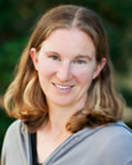
Receives $15,000 Promotion of Doctoral Studies II Scholarship
Ph.D. Student Sarah Gilliland has been awarded a $15,000 Promotion of Doctoral Studies II scholarship from the Foundation for Physical Therapy to support her dissertation research.
Ms. Gilliland, who previously earned a doctorate in physical therapy (DPT), studies professional development and science education in addition to physical therapy education.
Her dissertation, titled "Physical Therapist Students' Clinical Reasoning and Characterizations of Practice," focuses on how PT students learn to think critically and apply knowledge learned in the classroom to clinical practice.
Ms. Gilliand’s goal is to develop a line of research that will contribute to the development of guidelines for course and curricular development to promote effective teaching of basic science and clinical information.
She is advised by Professor Judith Haymore Sandholtz.
Ph.D. Student Sarah Gilliland has been awarded a $15,000 Promotion of Doctoral Studies II scholarship from the Foundation for Physical Therapy to support her dissertation research.
Ms. Gilliland, who previously earned a doctorate in physical therapy (DPT), studies professional development and science education in addition to physical therapy education.
Her dissertation, titled "Physical Therapist Students' Clinical Reasoning and Characterizations of Practice," focuses on how PT students learn to think critically and apply knowledge learned in the classroom to clinical practice.
Ms. Gilliand’s goal is to develop a line of research that will contribute to the development of guidelines for course and curricular development to promote effective teaching of basic science and clinical information.
She is advised by Professor Judith Haymore Sandholtz.
The Academy Charter High School Science Students Showcase Fall Science Research
Tenth grade students in Mr. Vincent Perez's science class at The Academy Charter High School in Santa Ana showcased their fall research during a poster session for the public on September 19th.
Mr. Perez had selected the top infectious diseases from the U.S. Center for Disease Control in Atlanta and asked students to select their top three choices. Based upon their selections, students were organized in teams of four to research the history, range, symptoms, and treatment of the disease and propose a new treatment, including unit cost and a dissemination plan.
Among the diseases selected were Poliomyelitis, Tuberculosis, Leprosy, Dengue Fever, Ebola, Malaria, Meningococcal Meningitis, Smallpox, Hepatitis B, and Crimean-Congo Hemorrhagic Fever.
Reviewers from UC Irvine and from the community listened to the student presentations, which included a public service announcement, either print or video, promoting their proposed treatment, and then offered praise and suggestions for improvement.
The Academy Charter High School is a partnership among the Orangewood Children's Foundation, Orange County Department of Education, and the UC Irvine School of Education.
Tenth grade students in Mr. Vincent Perez's science class at The Academy Charter High School in Santa Ana showcased their fall research during a poster session for the public on September 19th.
Mr. Perez had selected the top infectious diseases from the U.S. Center for Disease Control in Atlanta and asked students to select their top three choices. Based upon their selections, students were organized in teams of four to research the history, range, symptoms, and treatment of the disease and propose a new treatment, including unit cost and a dissemination plan.
Among the diseases selected were Poliomyelitis, Tuberculosis, Leprosy, Dengue Fever, Ebola, Malaria, Meningococcal Meningitis, Smallpox, Hepatitis B, and Crimean-Congo Hemorrhagic Fever.
Reviewers from UC Irvine and from the community listened to the student presentations, which included a public service announcement, either print or video, promoting their proposed treatment, and then offered praise and suggestions for improvement.
The Academy Charter High School is a partnership among the Orangewood Children's Foundation, Orange County Department of Education, and the UC Irvine School of Education.

